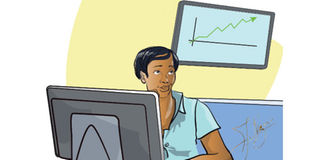Why women shouldn’t ignore small signs of aggression at work

Women subjected to micro-aggressions and who self-shield are three times more likely to contemplate leaving their jobs and four times more likely to experience burnout.
What you need to know:
- As advocates for women, it’s important to make mountains out of the molehill that’s micro-aggression.
- Women subjected to micro-aggressions and who self-shield are three times more likely to contemplate leaving their jobs and four times more likely to experience burnout.
American Olympic champion Simone Biles recently responded to a misused image in a Wall Street Journal article celebrating her extraordinary legacy with “This picture isn’t even me...try again.”
The image was of her fellow athlete, Shilese Jones. Though the error was corrected, the ensuing X (Twitter) storm shed light on a deeper issue.
I initially considered the outrage over the mistake as oversensitivity and read through the avalanche of tweets with growing scepticism, until I delved into McKinsey & Company’s latest report, Women in the Workplace 2023, done in collaboration with LeanIn.Org.
I realised I was wrong, and that there’s no such thing as oversensitivity when it comes to micro-aggressions, especially when aimed at women. The report shattered the myth that they have only a ‘micro’ impact.
The report defines micro-aggressions as subtle everyday discrimination rooted in bias, encompassing comments and actions that belittle someone based on their gender, race, or other aspects of their identity.
These behaviours signal disrespect, create acute stress, and negatively affect women’s careers and well-being. The data reveals that women experience micro-aggressions at a significantly higher rate than men, such as being mistaken for someone junior and hearing comments about their emotional state.
Simone’s experience, along with comments shared, resonates with my own encounters with micro-aggressions in the corporate world.
If I polled women about how often they’ve been advised to “relax,” “stay calm,” or “avoid being emotional” at work, even when expressing a professional and well-considered opinion, I’m confident that 100 per cent of respondents would answer affirmatively.
Women will also tell you about how people have told them they were too young, too inexperienced, or too soft to hold certain positions of power in the workplace. And these words put a dent on their self-confidence, drastically affecting their performance.
The research underscores that the workplace can be a mental minefield, especially for women with traditionally marginalised identities. Women who experience micro-aggressions are much less likely to feel psychologically safe, which makes it harder to take risks, propose new ideas, or raise concerns.
The stakes feel just too high. Additionally, 78 per cent of women who face micro-aggressions self-shield at work or adjust the way they look or act in an effort to protect themselves.
Women subjected to micro-aggressions and who self-shield are three times more likely to contemplate leaving their jobs and four times more likely to experience burnout.
The research emphasises that unchecked micro-aggressions hinder companies from harnessing the full potential of their female employees, risking the loss of talented employees.
As advocates for women, it’s important to make mountains out of the molehill that’s micro-aggression.
The writer comments on social and gender topics (@FaithOneya; [email protected])




